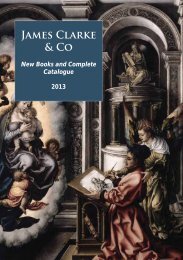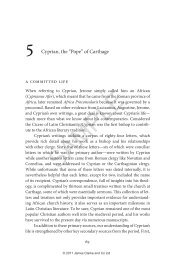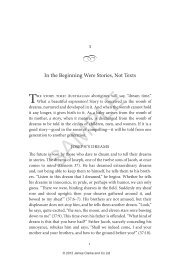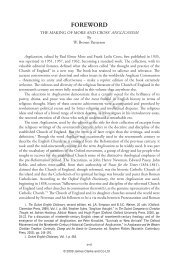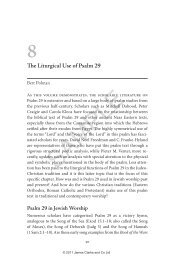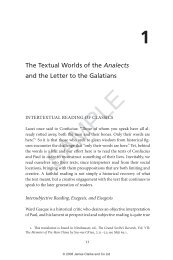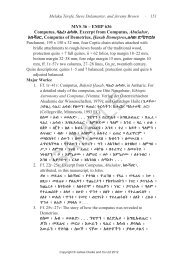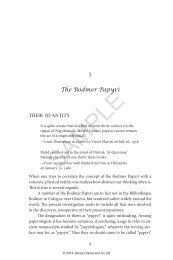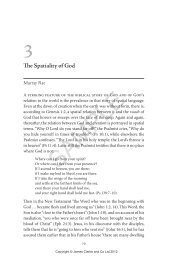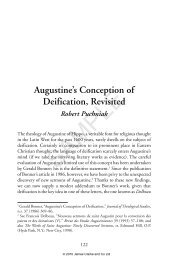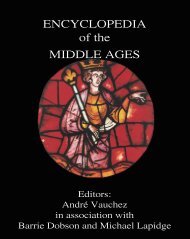Introduction by Kirk R. MacGregor - James Clarke and Co Ltd
Introduction by Kirk R. MacGregor - James Clarke and Co Ltd
Introduction by Kirk R. MacGregor - James Clarke and Co Ltd
You also want an ePaper? Increase the reach of your titles
YUMPU automatically turns print PDFs into web optimized ePapers that Google loves.
<strong>Introduction</strong><br />
of one’s own soul) <strong>and</strong> where each individual in good st<strong>and</strong>ing with God<br />
is a pneumatikov~ a[nqrwpo~ (“spiritual human,” or a human dominated<br />
<strong>by</strong> the Christlike desires of the Holy Spirit). The transformation from a<br />
yucikov~ to a pneumatikov~ a[nqrwpo~ cannot be accomplished <strong>by</strong> human<br />
effort, such as religious affiliation or acts of social justice, since no<br />
one can alter the fundamental inclination of one’s soul. Exclusively the<br />
work of the Spirit, I explain the precise nature of the associated changes<br />
to the believer’s soul <strong>and</strong> why they effect a habitual harvest of good spiritual<br />
fruit, as opposed to the occasional good fruit which the unregenerate<br />
may yield. Moreover, these changes infuse the believer with a spectrum<br />
of theological virtues, classically summarized in Galatians 5:22–24, sufficient<br />
for acting righteously in all circumstances. All in all, the believer<br />
is marked as such <strong>by</strong> citizenship in the Kingdom of God, or adherence to<br />
the philosophy of life where God is the ruler over all earthly affairs but,<br />
when God rules, he does so as a servant leader who comes up alongside<br />
others with unconditional love <strong>and</strong> expects his followers to do the same.<br />
In chapter eleven, Georg Plasger examines the “negative side” of eternal<br />
security or the danger from which believers are secure, namely, God’s<br />
coming wrath, from the perspectives of Albrecht Ritschl (1822–1889),<br />
Martin Luther, <strong>and</strong> Karl Barth (1886–1968) <strong>and</strong> then considers each of<br />
these perspectives in light of the Pauline doctrine of redemption. Aiming<br />
to correct the past clerical abuses of placing inordinate guilt upon perceived<br />
transgressors, Ritschl severely de-emphasized God’s wrath to the<br />
point of objective nonexistence, such that God never exhibits anger <strong>and</strong><br />
expresses only love toward humanity. Thus, the wrath of God is reduced<br />
to a psychological construct where<strong>by</strong> individuals who have not yet embraced<br />
Christ fail to feel God’s ubiquitous love. By contrast, Luther regards<br />
God’s wrath as real <strong>and</strong> accounts for it <strong>by</strong> finding within the divine<br />
constitution a behavioral dualism, in which God displays his alien nature<br />
of judgment against sinful people but exhibits his true nature of love <strong>and</strong><br />
mercy toward believers. Luther also felt that believers experience the<br />
underbelly of wrath when God progressively destroys the old person of<br />
sin or “flesh” still resident within. Synthesizing Ritschl’s exclusivity of love<br />
with Luther’s veridicality of wrath, Barth underst<strong>and</strong>s God’s wrath as an<br />
expression of his love, since God does not direct his wrath toward creatures<br />
but toward the demonic forces of futility which threaten to destroy<br />
them. The exemplification of God’s wrath as a necessary component of<br />
his love occurs at the cross, there<strong>by</strong> concurring with Luther that wrath<br />
SAMPLE<br />
xxix<br />
© 2011 <strong>James</strong> <strong>Clarke</strong> <strong>and</strong> <strong>Co</strong> <strong>Ltd</strong>



